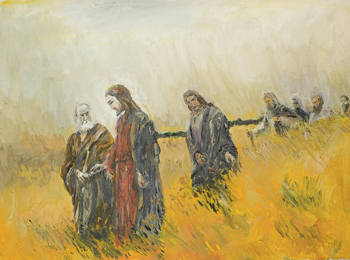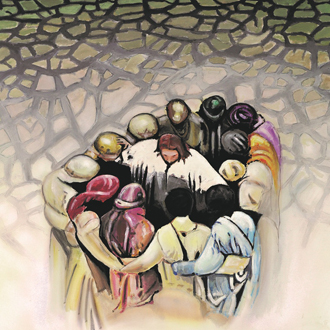For Sunday May 9, 2021
Lectionary Readings (Revised Common Lectionary, Year B)
Acts 10:44-48
Psalm 98
1 John 5:1-6
John 15:9-17
When my children were younger, I would use our drive home from church each week to ask what, if anything, they’d gleaned from Sunday worship. They’d rattle off a favorite hymn, or ask about a baffling scripture reading, or tell me about the gentleman who snored his way through the service in a nearby pew. If I asked them what the sermon was about, however, they’d give me the same answer every time: “Love. The sermon was about love.”
If I asked them to elaborate, they’d shrug. The sermon was about love. What else was there to say?
To this day, I’m not sure if they gave me that answer because they knew it would get me off their backs, or because they recognized that the Gospel in its entirety is about love. I hope it’s the latter. Because the latter is the truth.
Jesus makes this abundantly clear when he gives his disciples a commandment in our Gospel reading for this sixth Sunday of Easter: “Love one another as I have loved you.”
On the face of it, this is a weird commandment. Can we be ordered to love? Does love obey decrees? Most of us would say no. Shaped as we are by Hollywood films and romance novels, we usually think of love as spontaneous and free-flowing. We fall in love. Love is blind, it happens at first sight, it breaks our hearts, and its course never runs smooth.
 |
Even if we put our cultural clichés aside, we know that authentic love can’t be manipulated, simulated, or rushed. Those of us who have kids understand full well that commanding them to love each other never works. The most we can do is insist that our children behave as if they love: “Share your toys.” “Say sorry.” “Don’t hit.” “Use kind words.” But these actions — often performed with gritted teeth and rolling eyes — aren’t the same as what Jesus is talking about in John’s Gospel. He doesn’t give his disciples (or us) the easy “out” of doing nice things with clenched, resentful hearts. Nor would I want him to; nothing feels as hollow as a “loving” act performed lovelessly. Moreover, I doubt that the people who flocked to Jesus would have done so if they sensed that his compassion was brittle or forced.
No, when Jesus says, “Love as I have loved you,” he means it. As in, for real. As in, the whole bona fide package. Authentic feeling, honest engagement, generous action. Doesn’t it sound as if he’s asking for the impossible? Imagine what would happen to us if we took this commandment seriously. How would we have to change? What could Christendom look like if we obeyed orders and cultivated an “impossible” love?
I ask these questions with trepidation, because I don’t know how to answer them, even for myself. Many of us, after this long, brutal year of pandemic, are exhausted. We’ve seen and experienced so much loss. We’ve known the helplessness of empathizing in situations both local and global where we’re unable to intervene. We’ve been denied many of our go-to ways of expressing love — inviting people into our homes, giving each other hugs, worshipping together in person. In the face of so much pain, isolation, and death, what can love do? It’s easy to get lost in this question — or worse, give up on the question altogether, and retreat into numbness, anger, and apathy.
 |
But if, as my kids intuited from Sunday sermons years ago, the way of Jesus is all about love, then we need to find ways to press in. At the very least, we need to keep asking questions, and pursuing answers: How shall we love as Jesus loved? How shall we sustain such depths of compassion and remain healthy? Do we have it in us to experience a hunger for justice so fierce and so urgent that we’ll rearrange our lives in order to pursue it? Do we want to?
Much of the time — I’ll be honest — I don’t. I want to be safe. I want to keep my circle small and manageable. I want to choose the people I love based on my own affinities and preferences — not on Jesus’s all-inclusive commandment. Charitable actions are easy. But cultivating my heart? Preparing and pruning it to love? Becoming vulnerable in authentic ways to the world’s pain? Those things are hard. Hard and costly.
So what can I do? Where must I begin? Jesus offers a single, straightforward answer: “Abide in my love.” Following on the heels of last week’s Gospel, Jesus extends the metaphor of the vine and branches and calls us once again to abide. To rest, to cling, to make ourselves at home. Not simply in him, but in his love.
 |
My problem is that I often treat Jesus as a role model, and then despair when I can’t live up to his high standards. But abiding in something is not the same as emulating it. In the vine-and-branches metaphor, Jesus’s love is not our example; it’s our source. It’s where our love originates and deepens. Where it replenishes itself. In other words, if we don’t abide, we can’t love. Jesus’s commandment to us is not that we wear ourselves out, trying to conjure love from our own easily depleted resources. Rather, it’s that we abide in the holy place where divine love becomes possible. That we make our home in Jesus’s love — the most abundant and inexhaustible love in existence.
As is so often the case in our lives as Christians, Jesus’s commandment leads us straight to paradox: we are called to action via rest. Called to become love as we abide in love. In other words, we will become what we attend to; we will give away what we take in. The commandment — or better yet, the invitation — is to drink our fill of the Source, which is Christ, spill over to bless the world, and then return to the Source for a fresh in-filling. This is our movement, our rhythm, our dance. Over and over again. This is where we begin and end and begin again. “Love one another as I have loved you.” “Abide in my love.”
These are finally not two separate actions. They are one and the same. One “impossible” commandment to save the world. It’s all about love.
Debie Thomas: debie.thomas1@gmail.com
Image credits: (1) Fine Art America; (2) Worthpoint; and (3) magnet: encouraging enabling equipping.





